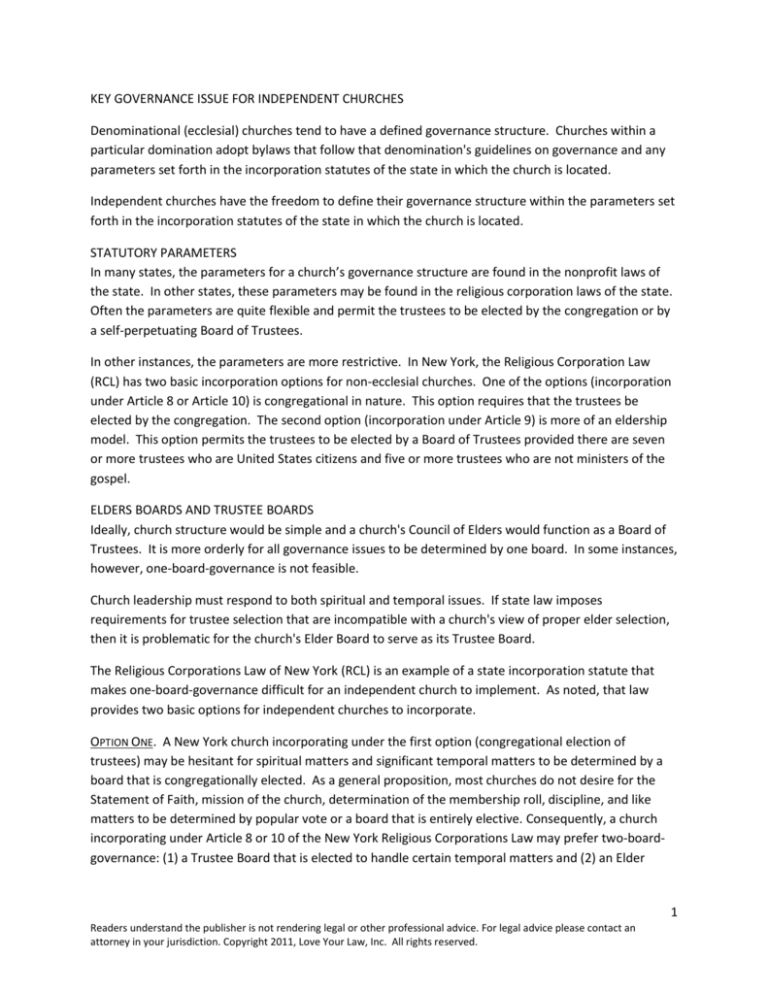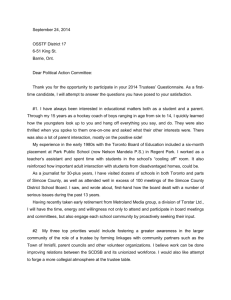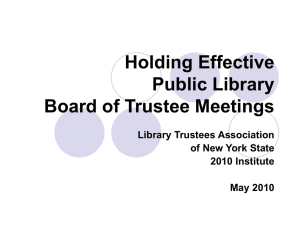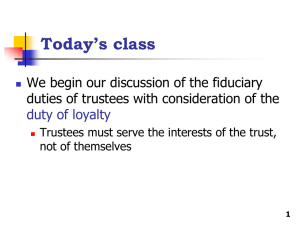
KEY GOVERNANCE ISSUE FOR INDEPENDENT CHURCHES
Denominational (ecclesial) churches tend to have a defined governance structure. Churches within a
particular domination adopt bylaws that follow that denomination's guidelines on governance and any
parameters set forth in the incorporation statutes of the state in which the church is located.
Independent churches have the freedom to define their governance structure within the parameters set
forth in the incorporation statutes of the state in which the church is located.
STATUTORY PARAMETERS
In many states, the parameters for a church’s governance structure are found in the nonprofit laws of
the state. In other states, these parameters may be found in the religious corporation laws of the state.
Often the parameters are quite flexible and permit the trustees to be elected by the congregation or by
a self-perpetuating Board of Trustees.
In other instances, the parameters are more restrictive. In New York, the Religious Corporation Law
(RCL) has two basic incorporation options for non-ecclesial churches. One of the options (incorporation
under Article 8 or Article 10) is congregational in nature. This option requires that the trustees be
elected by the congregation. The second option (incorporation under Article 9) is more of an eldership
model. This option permits the trustees to be elected by a Board of Trustees provided there are seven
or more trustees who are United States citizens and five or more trustees who are not ministers of the
gospel.
ELDERS BOARDS AND TRUSTEE BOARDS
Ideally, church structure would be simple and a church's Council of Elders would function as a Board of
Trustees. It is more orderly for all governance issues to be determined by one board. In some instances,
however, one-board-governance is not feasible.
Church leadership must respond to both spiritual and temporal issues. If state law imposes
requirements for trustee selection that are incompatible with a church's view of proper elder selection,
then it is problematic for the church's Elder Board to serve as its Trustee Board.
The Religious Corporations Law of New York (RCL) is an example of a state incorporation statute that
makes one-board-governance difficult for an independent church to implement. As noted, that law
provides two basic options for independent churches to incorporate.
OPTION ONE. A New York church incorporating under the first option (congregational election of
trustees) may be hesitant for spiritual matters and significant temporal matters to be determined by a
board that is congregationally elected. As a general proposition, most churches do not desire for the
Statement of Faith, mission of the church, determination of the membership roll, discipline, and like
matters to be determined by popular vote or a board that is entirely elective. Consequently, a church
incorporating under Article 8 or 10 of the New York Religious Corporations Law may prefer two-boardgovernance: (1) a Trustee Board that is elected to handle certain temporal matters and (2) an Elder
1
Readers understand the publisher is not rendering legal or other professional advice. For legal advice please contact an
attorney in your jurisdiction. Copyright 2011, Love Your Law, Inc. All rights reserved.
Board that is appointed or self-perpetuating to handle spiritual matters and any temporal matters not
delegated to the trustees.
OPTION TWO. A New York church incorporating under the second option (a Trustee Board of seven or
more members that is self-perpetuating) likewise may be uncomfortable with one-board-governance.
There may be seven individuals qualified to serve as trustees, but not seven members of the church
qualified to serve in an eldership capacity. If that is the case and the church wants the trustee board to
be self-perpetuating, then the church will need two boards: (1) a Trustee Board with seven or more
members and (2) an Elder Board with fewer members. The bylaws would then need to delineate the
function of each and the method of selecting each board.
FUNCTION OF ELDER BOARDS AND TRUSTEE BOARDS
In delineating the function of elder boards and trustee boards, attention must be paid to any statutory
requirements.
Trustee boards would generally be given the authority to vote of any acquisition or sale of real property
or the mortgage of real property. Trustee boards would generally be given the responsibility of
approving the annual financial report of the church and presenting that report to the assembly.
Trustees might be given the authority to retain auditors, approve the financial budget of the church and
approve changes to the bylaws.
Elder boards would generally be given authority over the content of the church’s Statement of Faith,
determination of the membership rolls, discipline of members, the selection of a senior pastor, and the
mission of the church. Elder boards would also be given an important concurring role in key temporal
matters, including bylaw changes and potentially the nomination of trustee candidates.
If a church has two boards, then each board must be given functions that are real.
FUNCTION OF THE SENIOR PASTOR
In an independent church, the role of the senior pastor is often a key role. The senior pastor is
considered the spiritual and temporal leader of the church and serves for an indefinite period. This
pivotal role is consistent with New Testament patterns and works well in the beginning years of a
church. As the church matures, the pivotal role of the senior pastor may need to be balanced by a
strong role for the board of elders and/or board of trustees. Pastoral leadership without pastoral
dominance is a worthwhile goal. Ecclesial churches have a built-in protection against undue dominance
by a board or a pastor, as ecclesial churches often have a mechanism for intervention by the parent
organization. Independent churches may use bylaw provisions to replicate some measure of that builtin protection.
APPROVAL OF BYLAWS
INITIAL BYLAWS. State law may provide that bylaw changes require congregational approval. Even if state
law is silent on the issue of congregational approval, it is wise for the initial bylaws to be approved by
the congregation. This protects the church from any assertion that the initial bylaws were not properly
adopted.
2
Readers understand the publisher is not rendering legal or other professional advice. For legal advice please contact an
attorney in your jurisdiction. Copyright 2011, Love Your Law, Inc. All rights reserved.
BYLAW AMENDMENTS. Typically, any amendment to the bylaws must first be approved by a church's
governing boards. After that approval, bylaw changes are typically brought to the congregation for
ratification.
3
Readers understand the publisher is not rendering legal or other professional advice. For legal advice please contact an
attorney in your jurisdiction. Copyright 2011, Love Your Law, Inc. All rights reserved.









